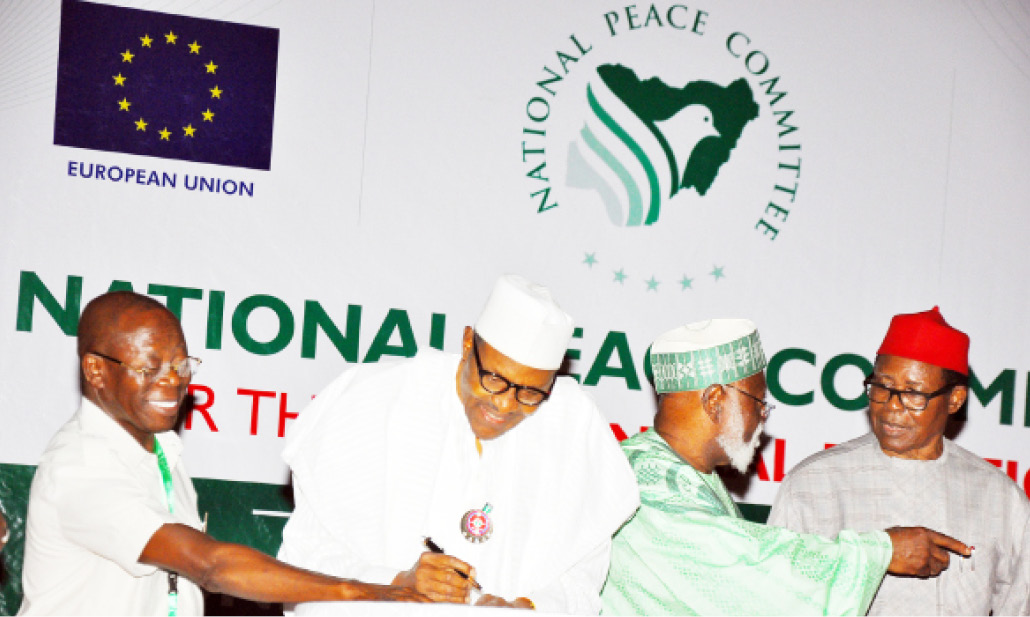Looking beyond the Peace Accord
Because of the diverse violent conflicts confronting Nigeria, tension is already heightened as we headed towards 2019 general elections. At the Technical Steering Committee inaugural meeting for the establishment of a National Peace Advisory Forum (NPAF) held in Abuja recently at the expense of the Institute for Peace and Conflict Resolution (IPCR), the Director of […]

From left: National Chairman, All Progressives Congress, Comrade Adams Oshiomhole; President Muhammadu Buhari; Chairman National Peace Committee, Abdulsalam Abubakar; and Vice Chairman National Peace Committee Commodore Ebitu Ukiwe, during the signing of a peace accord by President Buhari and other political parties’ presidential candidates for the 2019 General Election, in Abuja yesterday
Because of the diverse violent conflicts confronting Nigeria, tension is already heightened as we headed towards 2019 general elections.
At the Technical Steering Committee inaugural meeting for the establishment of a National Peace Advisory Forum (NPAF) held in Abuja recently at the expense of the Institute for Peace and Conflict Resolution (IPCR), the Director of Kukah Centre, Abuja, Rev. Fr. Atta Barkindo spoke much on the efforts made by the National Peace Committee chaired by former Head of State, General Abdulsalam Abubakar for the success of the 2015 presidential election. I am glad to note that much are being done by the same committee for peaceful 2019 general elections. These efforts and others that backstop for the committee including the IPCR are commendable. This was the more reason why IPCR launched one of its books, “Election Conflict Management: Lessons From the 2015 General Elections in Nigeria” to making copies available in the public domain. The book, according to the Acting Director General of the Institute, Dr. Bakut tswah Bakut was a collection of peer-reviewed papers by renowned academics carefully selected from universities, policy think-tanks, military and security establishments including the civil society groups. Perspectives within the text cover aspects responsible for the free, fair and credible elections. It is expected to help refresh our minds on possible actions we need to take, in avoiding pitfalls that could impede smooth transition and at the same time help us consolidate on the gains of the 2015 general elections. The book is useful hence it provides useful insights and lessons that will boost efforts for the success of future elections in our country, and in particular, the forthcoming 2019 general elections, in the words of Dr. Bakut.
There is no doubting the fact that Nigeria is polarized by deep-seated ethno-religious sentiment playing out in every facet of our system. As a multiethnic country, such divide could be natural; frankly speaking, this diversity remains the source of our strength and hegemony. We must therefore craft a more practical way of managing our multicultural system for our common pledge to one indivisible Nigeria to subsist.
Working for durable peace in every part of the country and not just for peaceful elections; that there should be peace before, during and after elections and at all time to make Nigeria a haven peace, lies the interest of IPCR. The goal of the NPAF is to make issues of peace more collaborative, governance to be participatory and challenges treated as common for joint action so as to attain durable peace and sustainable development.
The whole essence of these efforts is to ensure the promotion of peace, tolerance, efficient and effective ways of conflict resolution and national cohesion. NPAF will be a platform for Government institutions/agencies and the people to from time-to-time interrogate issues and converse support in bridging the gap between the government and the people.
To untwine the knots that fastened peace and sustainable development, there is the need for experts to take a closer look into our public policy both in terms the formulation and implementation. The issues of social inclusiveness, peaceful coexistence, and robust security system among others for good governance will find answers in our distributive and redistributive policies, constituents and regulatory policies as well.
Abu I. Michael is the Resident Information Officer (RIO), IPCR
